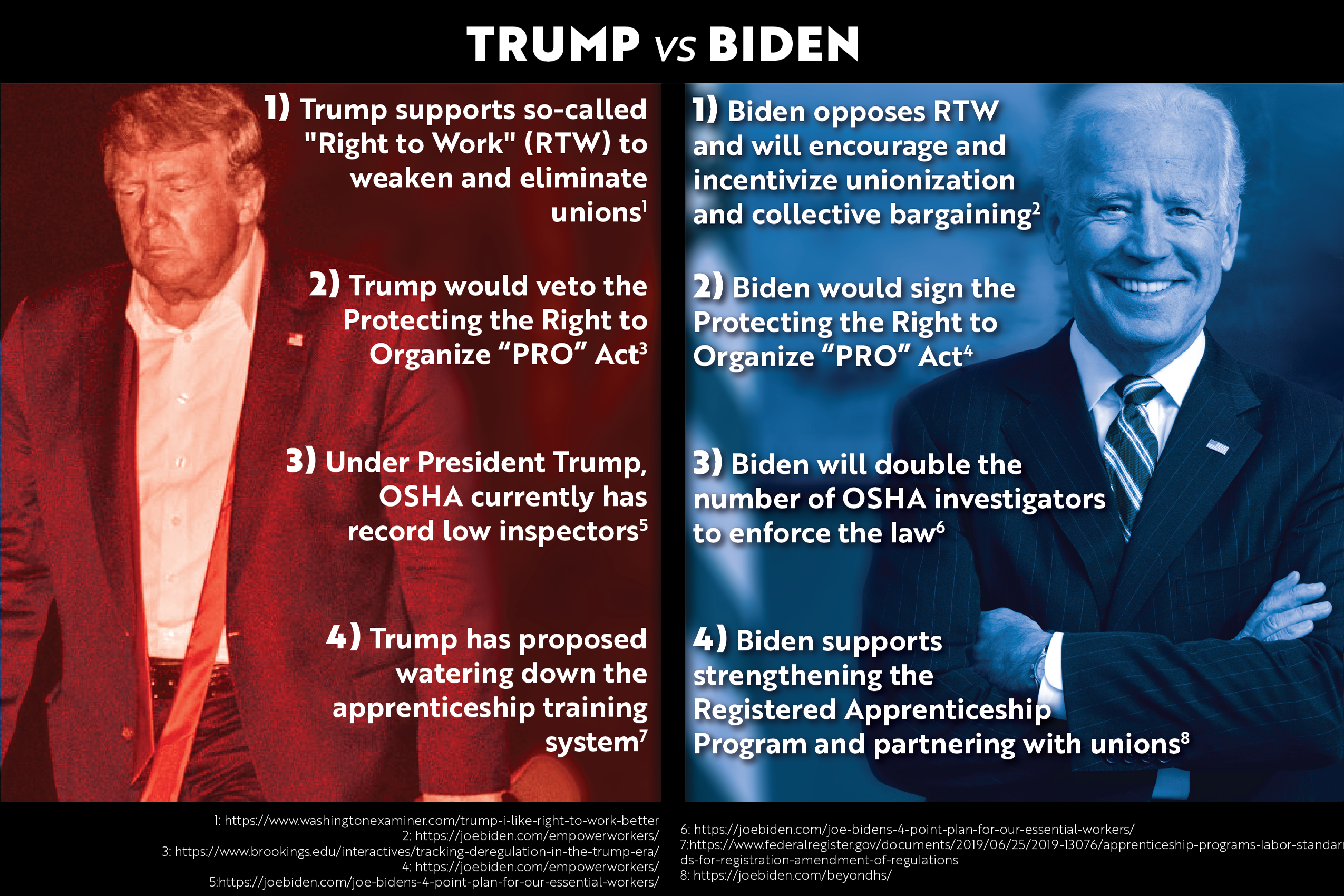Where Trump and Biden Stand on Our Key Issues?
 The Nov. 3 election between Republican President Donald Trump and Democrat Joe Biden will give American voters a choice between two candidates with drastically different views on key issues related to the working people and our Union. Here is a detailed look at their policies and proposals on these key issues:
The Nov. 3 election between Republican President Donald Trump and Democrat Joe Biden will give American voters a choice between two candidates with drastically different views on key issues related to the working people and our Union. Here is a detailed look at their policies and proposals on these key issues:
So-called “Right to Work” (RTW) laws: Intentionally misnamed by a network of nonunion business interests that have championed their passage, right-to-work laws are currently in effect in 27 states. These laws have lowered wages, reduced benefits, diminished jobsite safety, and do not guarantee any rights that are not already offered under federal law. The average worker in right-to-work states earns roughly $5,333 a year less than a worker in free-bargaining states.
Donald Trump favors states with Right-to-Work laws because he thinks “it is better for the people” to not have to pay union dues. He has promised to sign a national right-to-work law if it comes to his desk.
Joe Biden would ban Right-to-Work laws because “these laws exist only to deprive unions of the financial support they need to fight for higher wages and better benefits.” As President, Biden will repeal the Taft-Hartley provisions that allow states to impose RTW laws.
The Protecting the Right to Organize Act’s (PRO Act): The PRO Act restores fairness to the economy by strengthening the federal laws that protect workers’ right to join a union. It protects the basic right to join a union, enforces penalties for companies that violates workers’ rights, expands workers’ collective bargaining rights and closes loopholes that corporations use to exploit workers, and strengthens workers’ access to fair union elections and requires corporations to respect the results.
Trump threatened to veto the PRO Act. Trump administration issued a strongly worded statement opposing the PRO Act, one day before 224 members of the U.S. House of Representatives from both parties voted to approve the bill.
Biden strongly supports the PRO Act provisions instituting financial penalties on companies that interfere with workers’ organizing efforts, including firing or otherwise retaliating against workers.
Workplace Safety and Health Standards: Lawmakers, unions, and other stakeholders have worked for decades to institute health and safety protections for workers on the job. The Occupational Safety and Health Act of 1970 created OSHA which sets and enforces protective workplace safety and health standards for workers in industries including construction.
Trump has gotten rid of several OSHA safety standards and reduced the number of investigations that OSHA is taking part in. The result has been an increase in workplace deaths.
Biden would double the number of OSHA investigators to enforce the law and existing standards and guidelines to keep workers healthy and safe on the job.
Apprenticeship Training Programs: The Building Trades Unions have had more than 100 years of experience in running Apprenticeship programs for the various trades in construction. BAC members are highly skilled craftworkers because they go through the Union’s apprenticeship and training program, which provides them with a pathway to a career with fair wages, good benefits and a secure retirement.
Trump administration has proposed watering down the apprenticeship training program by developing Industry Recognized Apprenticeship Programs (IRAPs). IRAPs would expand the Apprenticeship model to new and emerging industries, and industries that have not been successful using the registered apprenticeship system.
Biden proposed to ensure all workers have access to education and training beyond high school, including federally registered apprenticeships. He promises to provide $50 billion in investments for workforce training and increase the number of apprenticeships in the nation by strengthening the registered apprenticeship programs and partnering with unions.
